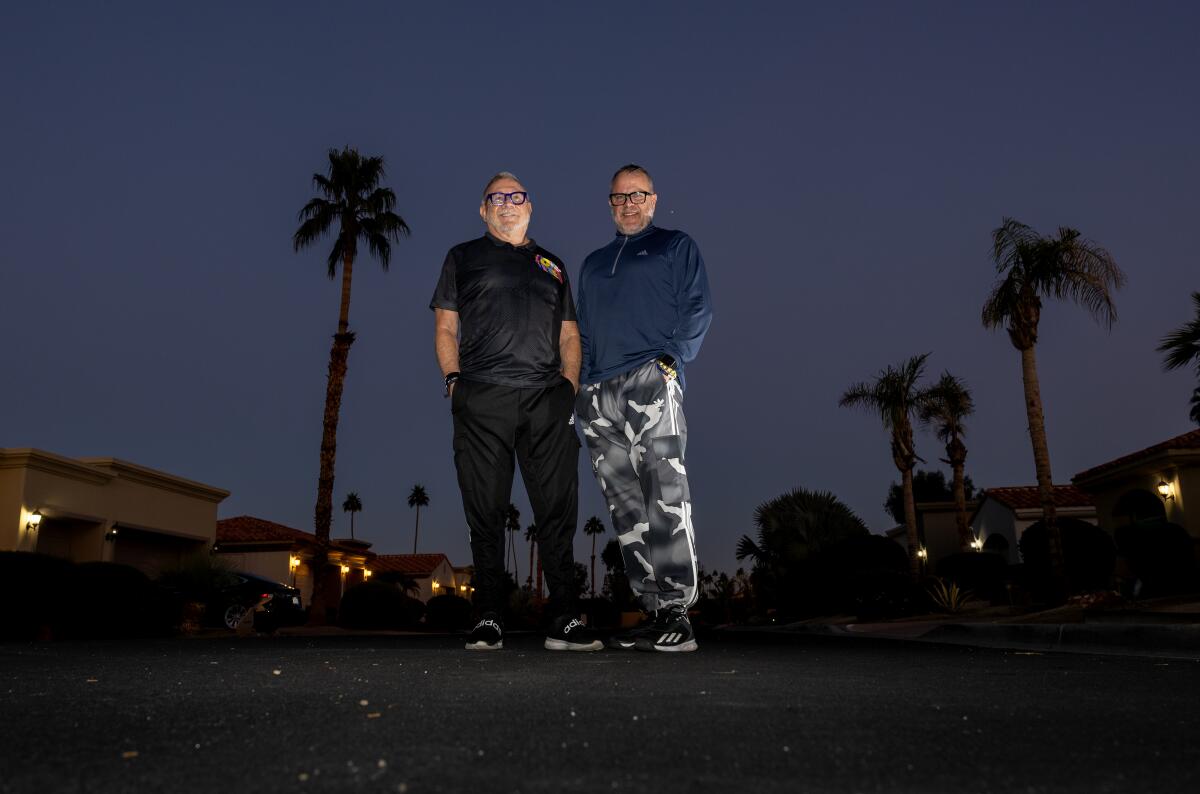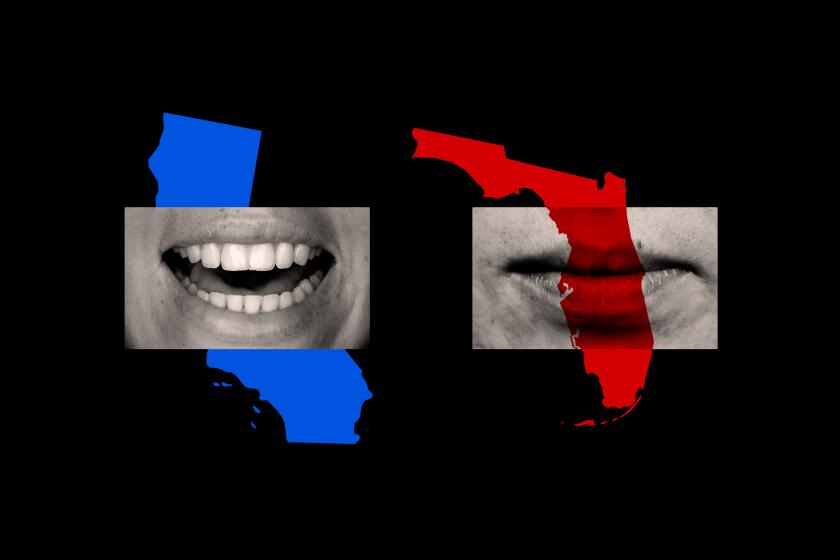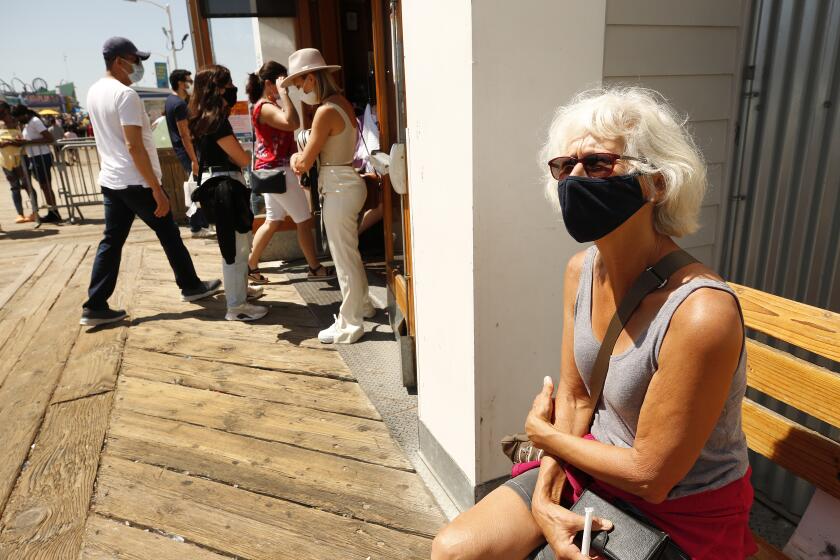California vs. Florida: Why are people moving from one state to the other?

- Share via
After 15 years in Florida, Valsin Marmillion decided it was time to get out.
Marmillion, a longtime campaign strategist, had been working as an adjunct journalism instructor at the University of Florida. He taught global activism and social change communication, discussing hot-button topics such as fake news and the Black Lives Matter movement.
After four semesters, the online course was canceled with little warning in the spring, he said.
Marmillion, 73, already was fed up with Florida: with Gov. Ron DeSantis and his anti-”woke” rhetoric. With school book bans. With the state’s “Don’t Say Gay” law and an environment that feels increasingly unsafe for LGBTQ+ people like him.


So in late July, Marmillion and his husband, Juan Pisani, bid farewell to their small horse farm in Alachua, piled into their SUV with their three dogs — Frida, Gaucho and Paco — and drove to the progressive bastion that is California.
“We’re cultural refugees,” said Marmillion, who is now settled in Rancho Mirage, where he is semiretired, doing some public relations work while his husband works as a tennis instructor. “Just the feeling of openness — that’s what we missed. The feeling of acceptance, the understanding that individual rights are very important and they should be protected and strengthened, not taken away.”
In September, Guerin Farley went the opposite direction, moving from a West Hollywood apartment to his parents’ house in the Florida Panhandle. His reasons had nothing to do with politics.
“What really, really unfortunately hit was my pocketbook,” said Farley, 38, a talent manager who had lived in California for nine years. “Even if you’re making six figures in L.A., you’re barely scraping by.”
Such cross-country moves between progressive California and conservative Florida have taken an outsize role in the rivalry between DeSantis and Gov. Gavin Newsom, who are set to debate Thursday night on Fox News about whose state offers a better model for the country.
Your guide to understanding Newsom and DeSantis ahead of their Thursday debate — and how they are shaping life in California and Florida.
Newsom, widely seen as a potential Democratic presidential candidate in 2028, ran a campaign ad in Florida last year encouraging that state’s residents to leave.
“Republican leaders, they’re banning books, making it harder to vote, restricting speech in classrooms, even criminalizing women and doctors. I urge all of you living in Florida to join the fight, or join us in California, where we still believe in freedom — freedom of speech, freedom to choose, freedom from hate and the freedom to love,” Newsom said in the ad.
And DeSantis, a Republican trying to reinvigorate his struggling presidential campaign, said in the spring that people are fleeing too-“woke,” too-expensive California and headed to Florida.

“If you look over the last four years, we’ve witnessed a great American exodus from states governed by leftist politicians imposing leftist ideology and delivering poor results,” DeSantis said.
More Californians are relocating to Florida than the other way around — but the number moving in either direction is minuscule compared with each state’s population.
Last year, according to newly released census data, roughly 29,000 Floridians moved to California, the nation’s most populous state, with 39 million residents.
Meanwhile, nearly 51,000 people moved from California to Florida, a fast-growing state of 22 million.
California’s population has decreased by more than 500,000 during Newsom’s tenure, while Florida’s population has increased by more than 700,000 with DeSantis in charge.

“Florida is booming. But its population is not growing because of Californians,” said Eric McGhee, a political scientist with the Public Policy Institute of California, who noted that people typically leave California for closer destinations, such as Arizona and Texas.
Despite the rhetoric, he said, people primarily relocate to other states — including Florida, which has no state individual income tax — for economic reasons like high housing costs, not politics.
The rise in remote work — mostly for high-income, white-collar workers — since the COVID-19 pandemic accelerated that trend, said McGhee’s colleague, demographer Hans Johnson.
“We don’t know how that’s going to play out going forward,” Johnson said. Increasingly, there “are signs that businesses are trying to lure people back to California,” including requiring in-person work and lowering salaries for employees who live in less expensive states, he said.
For many who have recently made the cross-country move between the Golden State and the Sunshine State, the rivalry and rhetoric between the two governors are entertaining — but mostly just noise.
“Life is about trade-offs,” said Matt Pressberg, who moved with his wife from Century City to south Florida in 2021. “Despite a lot of the bad politics and legislation in Florida that I don’t agree with, the overall quality of life for me and my wife is significantly better here.”
A report comparing speech and expression laws in California and Florida finds fault with both states but reserves its harshest judgment for Florida Gov. Ron DeSantis.
Pressberg, 41, and his wife are both native Angelenos. He grew up in Tarzana. She grew up on the Westside. They thought they would never leave.
Then, his public relations job went fully remote during the pandemic. They traded their small condominium for a 3,000-square-foot, four-bedroom house in Boca Raton. Pressberg works from his home office in his pool house.
“It‘s easy for right-wing people to say Californians are moving because they’re unhappy with progressive politics,” said Pressberg, who voted for Newsom. “That’s the Fox News take, but it’s not the truth. There are certainly quality-of-life issues in California that can be attributed to political choices, but it’s not that simple. It’s housing and economic opportunity.”
Farley, who grew up in the small Florida Panhandle town of Gulf Breeze, moved to Southern California in 2014 to work in entertainment, living mostly in West Hollywood.
He worked full time but increasingly could afford little outside rent and bills. Travel was becoming out of the question. Owning a home? Forget about it.
This fall, Farley stuffed all his belongings into his 2015 Ford Focus and drove home to Florida — listening to “Lord of the Rings” audio books and obsessing over Buc-ee’s and Love’s gas stations along the way.
He plans to get a second degree, in computer science, at the University of West Florida and catch up on his finances.
Farley said that while Florida’s conservative politics are “more intense and polarizing” than when he was growing up, he does not feel unsafe as a gay man and progressive Democrat. In person, he said, most people are warm, friendly and generous.
“People here — they are good people,” he said. “Southern hospitality is real.”
There’s another upside — Farley feels like his vote as a Democrat in the deeply conservative district represented by far-right U.S. Rep. Matt Gaetz is more powerful than in deep-blue California.
Will he be watching the Newsom-DeSantis debate?
“Begrudgingly,” he said. “Me and my folks will probably be around the TV, rolling our eyes.”
After living in Southern California for about two decades, Krystle Meyer, a 40-year-old attorney, also moved to Florida this year. She was driven out, she said, by financial pressures, homelessness and a deep frustration with California’s COVID-19 restrictions.
“My salary increases were not outpacing my rental increases,” she said. “I was losing money every year.”
Subscribers get early access to this story
We’re offering L.A. Times subscribers first access to our best journalism. Thank you for your support.
In 2019, Meyer rented a 600-square-foot, one-bedroom apartment in Marina del Rey for about $3,500 a month.
After a terrifying encounter with a homeless man wielding a machete as she walked to a movie theater, she moved into another one-bedroom apartment nearby, in a nicer building with tighter security. It cost $5,000 a month.
Money was getting tighter, she said, but for her time in California, “COVID was the final straw.”
For the better part of 2020, she strictly followed California health officials’ guidelines and rarely left her apartment. The state’s messaging seemed to her to suggest that if you visited loved ones, you were selfish and “you will kill them,” she said.
By Labor Day that year, her loneliness and anxiety became too much. She boarded a plane at LAX — masked, terrified of the virus and sanitizing everything she touched — and flew to visit her parents, who lived part-time in south Florida, near Palm Beach.
“When I landed in Florida, no one was wearing masks. No one cared. Everything was open. I was like, wait, you guys have been living like this for so long and you’re not dead? I was like, ‘What the hell am I doing?’”
Amid controversies over stay-at-home and masking orders, a lasting difference between Govs. Gavin Newsom and Ron DeSantis’ approach may end up being rhetoric on vaccine safety.
Her parents offered her their condominium, where they only stay a few times a year, and, in April, she moved permanently. Her new home is steps from the Atlantic Ocean and double the size of her Marina del Rey apartment.
“It’s awesome,” she said of her life in Florida. “I have no regrets.”
Meanwhile, Meyer’s close friend and fellow attorney, Cheryl Ainsworth, moved to California from Florida in 2007 and is never looking back.
When Ainsworth and her husband left the Sunshine State — while Barack Obama was running for president — it felt like Florida “was getting more restrictive and less appreciative of diversity, cultural and otherwise,” she said.
Soon after Obama’s election, she and her husband returned for a Florida Gators football game. She was shocked at the number of Confederate flags she saw flying.
“It’s not fair to paint the whole state, like California, with a broad brush,” said Ainsworth, 45. “But it definitely feels far more conservative than it was before, in a way that seems no longer purely philosophical.”
Ainsworth, her husband and three big dogs — a German shepherd, a golden retriever and a pointer mix — live in a rental house with a yard in Encino.
She’s just fine renting, high prices and all. Sure, she figures, she could own a home in Florida, but she likes living in California a whole lot better.
“People ask me all the time if I’ll ever move back,” Ainsworth said. “I say, ‘Something has gone horribly wrong if I am moving back to Florida.’”
More to Read
Sign up for This Evening's Big Stories
Catch up on the day with the 7 biggest L.A. Times stories in your inbox every weekday evening.
You may occasionally receive promotional content from the Los Angeles Times.














